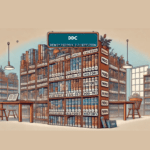Today’s world is called information rich world. A lot of information is constantly being produced in various branches of knowledge. The diversity of the concept of information and the enormous expansion of the publishing industry have made today’s world alarming. This abundance of information has created problems for users such as accessing information. Similarly, information organizations and suppliers as well as information scientists are constantly facing the problem of providing information at the right time. And to solve this problem, bibliographic services have been created.
Today’s society is an information society. The need for scientific, technical, medical and social research information is undeniable. Ensure full use of this information. Through work and service, people’s thoughts, experiences and results of worldly success are recorded in books. No one can keep all the news of these books. Therefore, the bibliographic service is the system developed to find the necessary information from this large number of databases through bibliography.
Bibliographic services can also be defined in other ways such as as the complex of facilities procedures and devices by which a Bibliography may be supplied, at a stated line, to file a distinctive need.

At present, various strategies are being adopted to ensure bibliographic services, among which the following are one of the strategies:
1. Bibliography Preparation: Various types of statutory bibliography including national, subject, author commercial.
2. Summary Functions: Summary, Periodic, Subject Summary etc.
3. Curriculum Functions: Formulation of subject wise Curriculum including Curriculum Periodicals.
4. Current and selected information notification services (SDI and CAS)
5. Translation services
6. Union Catalogue
7. Bibliography and information services etc.
Advantages of Bibliographic Services:
A developed library service of a country depends entirely on the provision of information on demand by competing with the library services of the contemporary world.
Especially on the provision of information on demand through bibliographic services. Especially the bibliographic service is one of those advanced services. Since time immemorial, people have been running in search of knowledge. Readers, researchers, students, try to find their required information through books, newspapers. Research work cannot proceed without the help of bibliography about the published information in the field of research. That’s why finding the latest information in the world with the help of bibliography is not a very difficult task today. In this case bibliography plays an important role without books there is no library. And if there are books in the library, it is necessary to ensure their use. And that is possible through bibliography. Bibliography greatly helps in the practice and dissemination of knowledge.
Talking about the benefits of bibliography, it has to be said that bibliography has considerable contribution and necessity in the progress of science. Moreover, the following benefits are available through bibliography.
1. Saves user time, labor and money.
2. Helps to deliver the required information quickly.
3. Helps to avoid duplication of publications or research.
4. Through literature searching helps.
5. Information Retrieval helps.
6. Bibliography serves as an important tool in the documentation process.
7. No research is possible without bibliography. But works as a researcher as well as a locator.
8. To research a subject, the help of bibliography helps the researcher to easily know what books or materials are available on the subject.
The purpose of bibliography is to enable the seeker of knowledge based on books to search for the knowledge published in the world.
Current Status of Bibliographical Services in Different Countries of the World:
Please remember the following information:
The current status of bibliographical services varies significantly across countries, driven by factors such as technological advancements, research funding, and government policies.
1. Global Trends: Bibliographic services are being modernized at an international level through digital platforms like Scopus, Web of Science (WoS), and emerging competitors such as Dimensions and Google Scholar. These platforms enable broad access to research publications, citation analysis, and collaborative opportunities for researchers. However, biases in coverage, such as underrepresentation of non-English and non-Western publications, persist. This can hinder the visibility of research from developing countries.
2. Developed Nations: In countries like the USA, UK, and several European countries, bibliographic services are highly developed. Universities and research institutions often have access to comprehensive digital libraries and databases, offering advanced tools for information retrieval and research analytics. These countries have a strong focus on web-based services, digitization, and the integration of open-access repositories that make academic work more accessible and citable.
3. Developing Nations: Countries in Africa, Asia, and Latin America often face challenges in their bibliographical services, including limited infrastructure, inconsistent funding, and a lack of access to the latest digital tools. For instance, while Nigeria and India have made strides in developing digital libraries and university-based services, the quality and reach of these systems often lag behind those in wealthier nations.
4. Digitization Efforts: There is an ongoing effort to digitize collections across both developed and developing countries, particularly in the aftermath of the pandemic. This shift is aimed at increasing accessibility, reducing costs associated with physical archives, and supporting distance learning. However, digitization remains uneven, with smaller institutions or those in less affluent regions struggling to keep pace.
Overall, bibliographical services are evolving globally, with a notable gap between countries that have access to cutting-edge technologies and those that do not. Collaboration across borders, better funding, and more inclusive digital policies could help bridge this gap.
A brief discussion of UNISIST:
In the last two decades, UNESCO has undertaken various activities aimed at providing a permanent basis in the world information system and has yielded benefits in the field of informatics. After the success of the primary, there is a need to work at the second level, i.e., the international level. And in order to meet this need, a joint program called UNISIST was born under the initiative of ICSU. Its full name is the United Nations World Science Information System 1.
Although UNISIST is an international information system, it is not a specific center located in a specific city as imagined in the eighteenth or nineteenth centuries. It is a program and depends on the voluntary cooperation of various countries. A significant part of the cooperation is the exchange of information. “UUNISIST is not a giant center, not a super system, but a program working to enhance the voluntary cooperation needed to make an evolving network of services.”.
Principles:
The principles on which UNISIST was founded are:
1. Exchange of published information among all types of scientists.
2. Bringing equality in vocabulary and other areas to make this exchange successful.
3. Encouraging exchange of public and public information.
4. Harmonization of scientific information preparation methods of different countries.
5. Modernizing applications for scientific information exchange.
6. To help various countries to get current and future information services in the field of science.
7. Development of educated manpower in the field of information science.
8. Encouraging the participation of scientists in data analysis and evaluation for information systems use.
9. Removal of administrative and legal barriers etc. to facilitate exchange of scientific information between different countries.
The digitization of bibliographic services is becoming more widespread and accessible in developed countries, offering powerful tools for research, citation, and collaboration. However, developing nations encounter challenges related to infrastructure, access to digital databases, and the visibility of their research output. Closing this gap necessitates ongoing global collaboration, technological investment, and inclusive policies to guarantee fair access to scholarly resources on a global scale.



